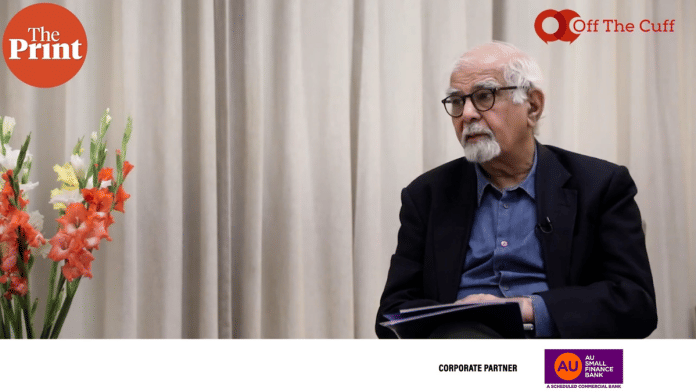New Delhi: India lags behind in data as important indices such as Census and Consumer Survey haven’t been released since years, said Surjit Bhalla, former executive director of International Monetary Fund (IMF) and former member of the Prime Minister’s Economic Advisory Council.
“There is very bad quality data in India. The Consumer Survey 2017-18 was the worst. It was scrapped by the government because of the poor quality of data. But since then, the data has not been released,” Bhalla told ThePrint on the latest episode of ‘Off The Cuff’ interaction on Saturday.
He emphasised how the government should have released the data but not endorsed the 2017-18 survey because it lacked quality.
Further in the hour-long show, Bhalla put some light on economic developments during the UPA (United Progressive Alliance) and NDA (National Democratic Alliance) periods, subsidies and how factors like employment and economic growth matter as India is going to vote in a few months.
In the monetary policy announcements Thursday, Reserve Bank of India governor Shaktikanta Das projected the growth for FY2024-25 at 7 percent.
Soon after the bi-monthly policy was announced, Parliament was filled with arguments between the BJP and the Congress party with both the sides targeting each other with the ‘white paper’ and the ‘black paper’.
Comparing the economic growth trajectory of India during the NDA and the UPA governments separately, Bhalla said that growth was happening at both the times.
The former IMF executive director further said that during the Covid times, India was the only country that was doing economically well.
Further, he said that India under the Modi government grew economically even though the world was slowing. This was distinct from the previous period, he said, since then India was growing at a time when even the world was growing robustly.
Subsidy vs Revdi
As elections inch further closer, the politics around the economy grows as seen in the recent state elections — while the parties often target each other on ‘freebie politics’ — each one of them introduced a scheme which either guaranteed free service/product or subsidy.
When asked about what is the difference between a subsidy and a ‘revdi’ (freebie) and which one helps the economy better, Bhalla sided with subsidy. “Revdi is a bad subsidy.”
Bhalla explained that subsidies are meant to help the people with incentives and should be limited to citizens who are deserving of the subsidy.
Any subsidy just for the sake of garnering votes is bad for the economy, he asserted. Bhalla criticised the Delhi government’s free bus rides for women in this regard.
He said that sectors like sanitation, health, rural development and education need subsidies and that the government is right to introduce subsidies there.
Moreover, the discussion around subsidies for citizens highlights the need for a critical examination of how these financial aids are distributed and who truly benefits from them.
However, Bhalla presented a critical view of food and LPG subsidies being extended to large sections of the population. He said the Food Security Act post-Covid covered 75 percent of rural and 50 percent of urban population.
“I don’t think two-thirds of the population should be getting a food subsidy,” added Bhalla. Instead the focus should be targeted on better universal basic income, he said.
Surjit Bhalla on unemployment as an election issue
On the issue of unemployment, the economist pointed out that it was particularly high within the youth. Bhalla said that according to the Periodic Labour Force Survey (PLFS) data, the unemployment in India stood at 4 percent.
Diving deep into the topic, he explained that the increased supply of skilled and educated labour force was a reason behind it. He also said that this trend was prevalent in all the countries except the US.
Bhalla also said that data sets show that unemployment tended to fall sharply over the age of 30, as people who were trying to find jobs before then settle for what they can find.
However, he opined that unemployment was not as big an issue as it is portrayed.
Privatisation of sectors & investment flows
Bhalla backed the government’s decision to privatise public sector companies, saying that it was not necessary for the government to be present in every sector. He emphasised further on the importance of industrial policy in the country.
He said the government should be open to using new tools to better the economy.
On the issue of declining Foreign Direct Investment inflows into India, Bhalla said that a country should have an environment that is conducive and easy for foreigners to do business.
Speaking about what the new government should do following the 2024 General Elections, Bhalla asserted that it should reduce rates of the Goods and Services Tax and only reduce income tax.

Also Read: India can’t grow alone with services, need to revamp manufacturing, says Shaurya Doval






